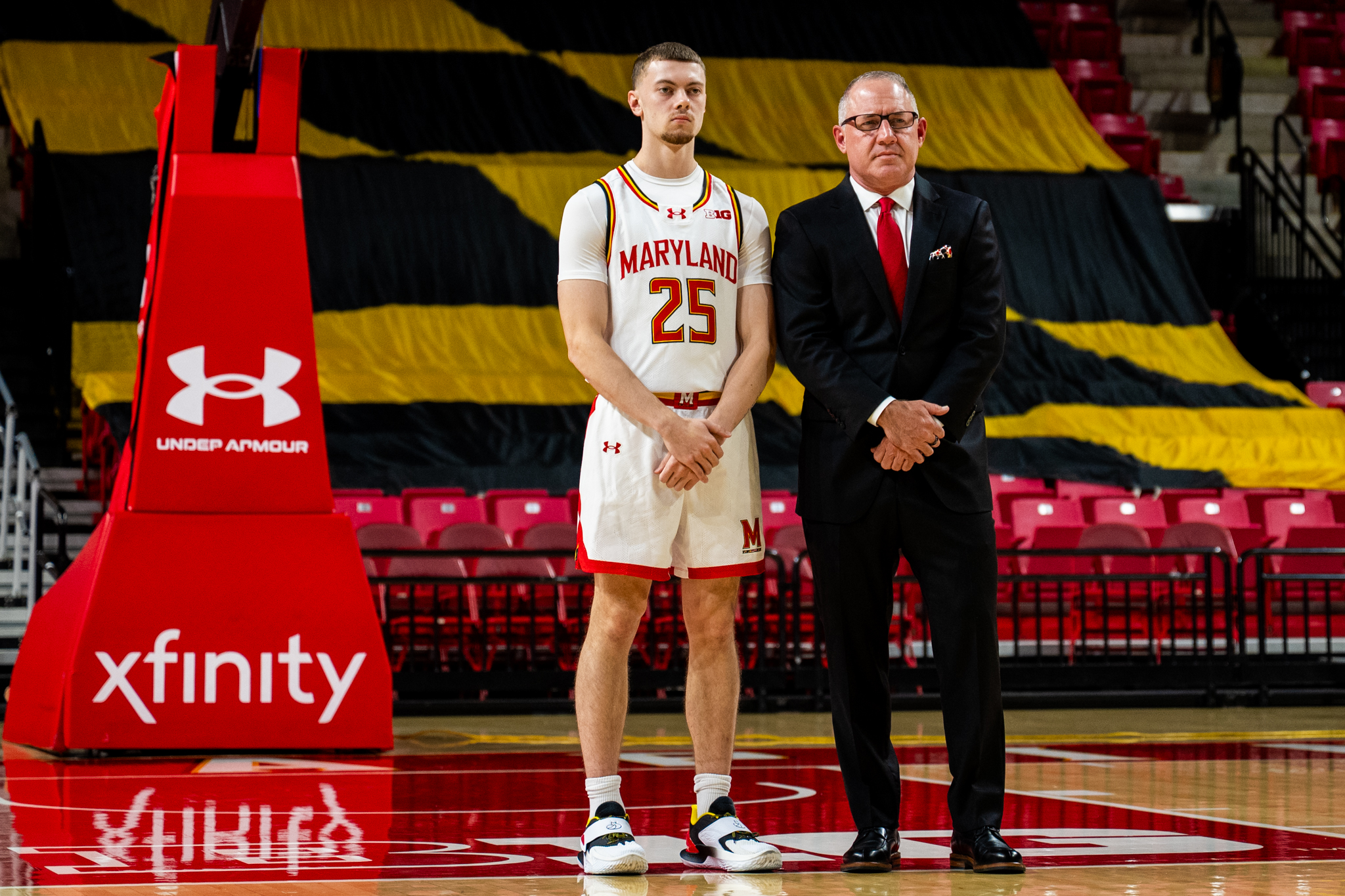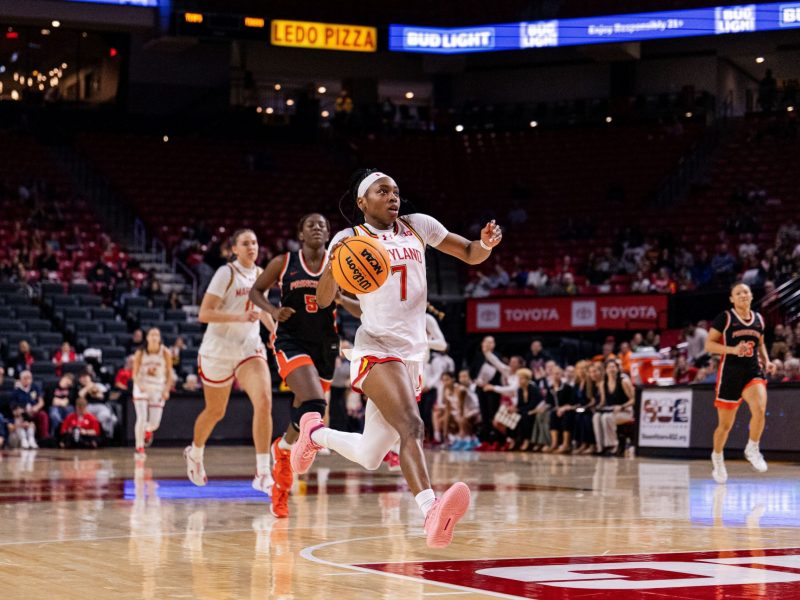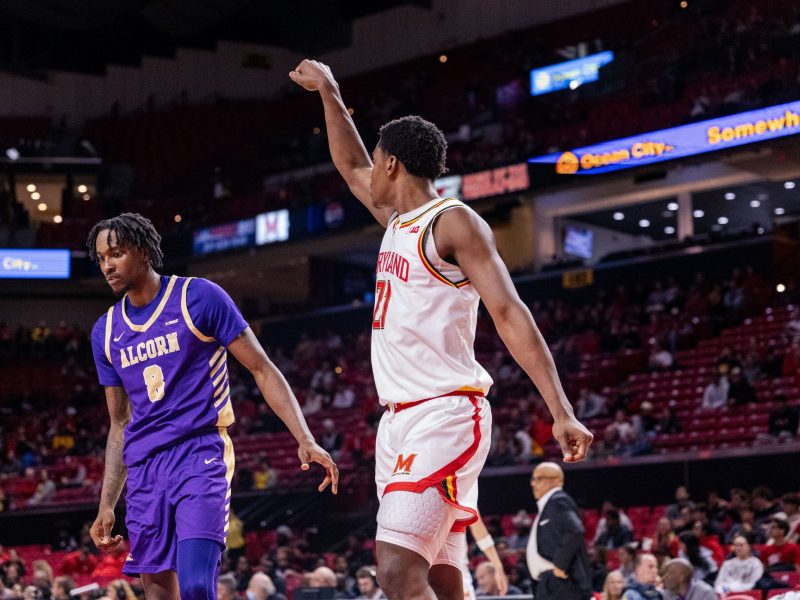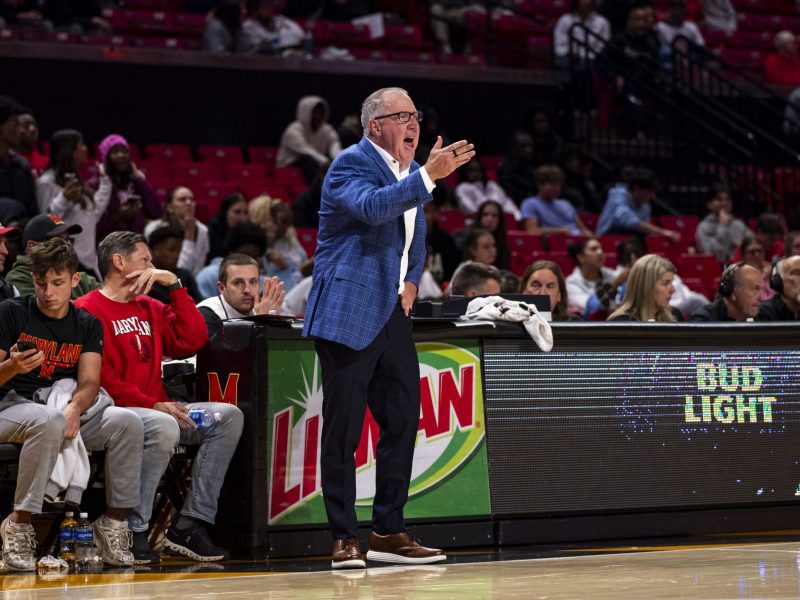The No. 25 jersey holds a special place in the history of Maryland men’s basketball.
From the 1950s to the 2020s, standouts such as Gene Shue, Ernie Graham, Jalen Smith and Derik Queen have donned the number. But during the golden days of the program, it belonged to Steve Blake.
The starting point guard for Maryland’s 2002 national championship-winning team and the Terps’ all-time leader in assists, Blake’s jersey hangs from the rafters of Xfinity Center.
His son, Nick Blake, will be the next player to sport No. 25.
“I’ve worn 25 multiple other times, as well, for my dad. I wore it in high school and AAU,” Blake said. “Wearing that number here too … he kind of gave me the go-ahead.”
But it wasn’t always certain Blake would continue his father’s legacy in College Park.
Before committing to coach Buzz Williams and Maryland as a preferred walk-on, Blake drew significant attention from lower-division colleges as an upperclassman in high school.
Blake played for TRD, a club team in Under Armour’s AAU circuit, in the summer after his junior year at Olympia High School in Orlando. The development of his game during his time playing for TRD and his senior year at Olympia sparked a recruiting push.
The 6-foot-2 guard hit seven threes in the first game of his senior year, the initial signs of a prolific shooting season. Blake shot 38.4 percent on 3-pointers and averaged more than seven long-range shots a game.
[Buzz Williams tempers expectations at Maryland men’s basketball’s media day]
Olympia coach Justin Shipp said once opposing teams started watching Blake’s film, they’d face guard him and try to eliminate him from the game.
As defenses began paying more attention to Blake, so did recruiters.
“It got to a point where, during the recruiting process, my phone would ring and I wouldn’t even know the number and I would just know, this call’s for Nick,” Shipp said. “It was a lot of people extremely interested in him because of the way he can shoot it, because of his grades, because of his work ethic … my phone was going bonkers for him.”
Blake didn’t receive a Division I offer, so he first committed to the University of Scranton, a Division III program. He attributes his decision to Scranton being “one of the better DIII programs in the country,” and being the right fit for his freshman situation.
Maryland recruited Blake after Williams was hired in April. Once he had the opportunity to join the Terps, it was a natural choice.
Williams and the rest of the staff are already like family, Blake said, and Maryland is a familiar place. One of the first college practices Blake watched was in College Park, and he’s spent lots of time in Maryland.
“It’s the place that I’ve been around my whole life,” Blake said. “If I’m able to make an impact here, it’s going to be a great decision no matter what.”
But opting to play for a Division I school as a preferred walk-on rather than with a Division III program entails a battle for playing time.
Blake said it doesn’t concern him.
[5 numbers that could define Maryland men’s basketball’s season]
“That’s not something I’m worried about. As long as I’m able to contribute, I’m happy,” Blake said. “I’m a freshman, I’m getting better every day. I’m trying to improve, improve, improve, and so one day maybe I can see the floor and impact the game.”
Former Maryland coach Gary Williams drew parallels between Steve Blake and his son when they each entered college.
“Just like with Steve, when he came in there [were] no guarantees,” Gary Williams said. “We knew he was a good player, but I didn’t know how good he was going to be. He worked really hard to become the player he eventually became.”
Though Blake profiles more as a shooting guard and a three-point specialist, he and Steve Blake share similarities as players.
Shipp highlighted the younger Blake’s playmaking, basketball IQ, work ethic and scrappiness as areas of his game that stood out. His father possessed these same qualities.
Steve Blake averaged seven assists a game in his four years at Maryland and is sixth in NCAA history in total assists. Gary Williams attributed Steve Blake’s success to his work ethic, toughness and resolve.
Blake recognized the impact of watching his father play. He believes he inherited some of Steve Blake’s competitiveness, and that the insight his father gave him helped him learn the game.
But learning from his father’s experience didn’t make Blake complacent. Even as his father’s No. 25 jersey looms over Xfinity Center court, Blake takes nothing for granted.
“It’s me,” Blake said. “I’m gonna be the one to put in the work, to set my own standards and just go as far as I can go.”



